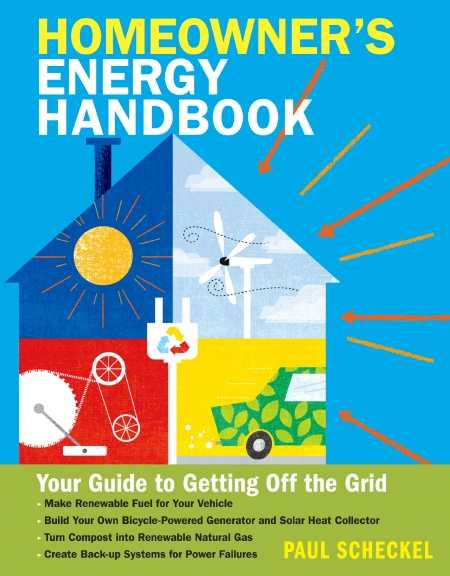
Homeowner's Energy Handbook
Your Guide to Getting off the Grid
In The Homeowner’s Energy Handbook, Paul Scheckel, a meticulous homeowner intent on living as far off the grid as possible, shares his research and his real life experience.
The goal of the book is to provide readers with the most cost-effective, self-empowered, and energy-efficient home-energy solutions, and it unequivocally reaches its goal. The book starts by helping readers break bad habits through increasing awareness and assessing usage.
The Homeowner’s Energy Handbook is split into two parts: home energy efficiency and renewable energy. The home-energy section is more accessible to the average homeowner, leading them through an extensive home-energy audit and providing in-depth advice about how to improve home insulation. The renewable energy section becomes increasingly involved (and daunting, for many readers). It begins with simple solar energy ideas and works its way to making your own biogas, a rather involved scientific process.
Scheckel exhaustively looks at solutions and takes an honest look at just how practical each one is (for example, he states that “it is somewhat rare to find a location that meets all the practical requirements to make harnessing water power worthwhile”). The book gives step-by-step instructions for building your own bicycle-powered battery charger, solar hot-water batch heater, biodiesel kit, and more. Each set of instructions has a comprehensive list of materials (that contains all the specifications beginners will need) and methodical, thoroughly explained steps. While the directions are clear enough for beginnings, having some mechanical and tool knowledge will help ensure the desired result.
Throughout the book there are many very effective two-color diagrams that illustrate key energy concepts and components of energy-saving devices. They help readers visualize what they’re doing and give them confidence that they’re building things correctly. Tables and charts also give readers the data and equivalencies they’ll need to make accurate calculations.
The book is great for fastidious home scientists. Readers who find the content a bit overwhelming will be encouraged by profiles of real-life people who’ve used the tools the book describes to revolutionize their energy use. But many who are just aiming to trim their utility bills will find Scheckel’s “get off the grid” approach a bit extreme. For those who share his sentiments, this is a one-of-a-kind resource.
Reviewed by
Melissa Wuske
Disclosure: This article is not an endorsement, but a review. The publisher of this book provided free copies of the book to have their book reviewed by a professional reviewer. No fee was paid by the publisher for this review. Foreword Reviews only recommends books that we love. Foreword Magazine, Inc. is disclosing this in accordance with the Federal Trade Commission’s 16 CFR, Part 255.
